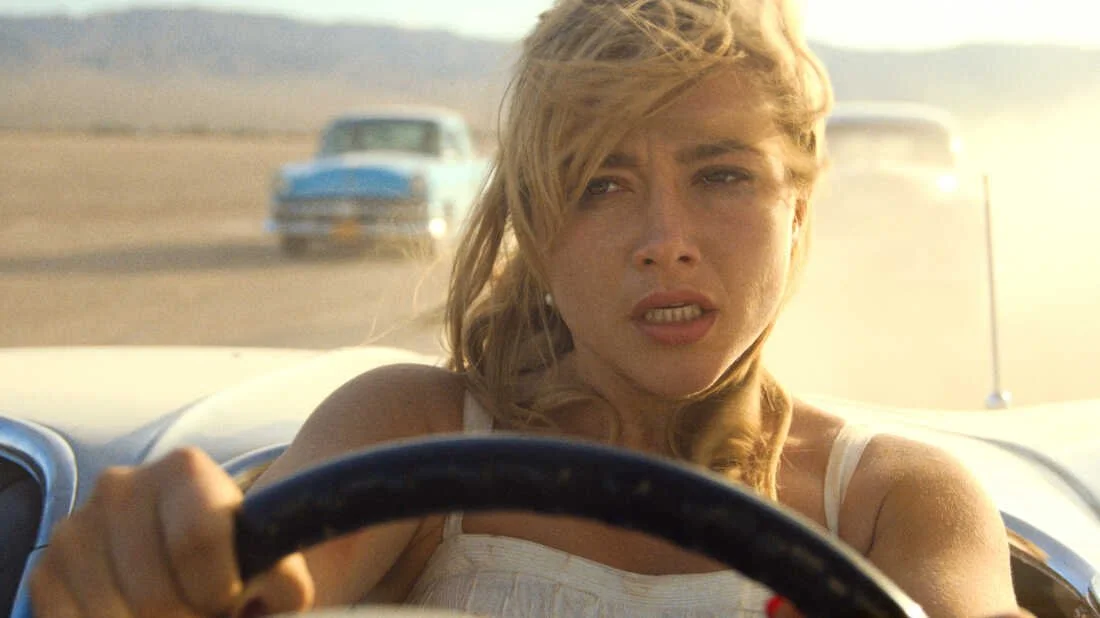“Don’t Worry Darling” – Alice in Blunderland
Rating: 2/5
Premise:
Alice (Florence Pugh) and Jack (Harry Styles) are a young couple living an idyllic life in a 1950s town called Victory, situated smack dab in the California desert. He’s the dutiful breadwinner and she’s a happy housewife that cleans, cooks, goes shopping with her friends and organizes parties. The community is lead by Victory CEO Frank (Chris Pine) who’s convinced everyone that this is the ultimate way of life. But it’s all too good to be true, and one of Alice’s friends isn’t buying it. Before mysteriously disappearing, she plants a seed of doubt in Alice. Soon. she’s plagued by visions and memory lapses, prompting her to investigate the secret behind the mysterious Victory Project, leading to a shocking discovery that changes her life forever.
The Verdict Upfront
Does the above sound familiar? That’s because it is. And that’s a shame because “Don’t Worry Darling” has a few things going for it: Competent actors, superb set design, a stellar soundtrack and creepy score. Too bad that the story is so devoid of originality that it’s little more than a pastiche of psychological thriller tropes. Despite the actors’ best efforts, it never rises above an average, drawn-out episode of “Black Mirror”.
No Expectations
I went into “Don’t Worry Darling” with little knowledge about the film. I knew about the cast, the alleged drama on-set, and the general premise. Most trailers give away too much of the movie. In this case, there was nothing to spoil since you see where it’s going from the get-go. I badly wanted the film to diverge from the rehashed tropes, but it never does. There’s a twist that makes things a bit more interesting, but it’s nothing that hasn’t been done already.
Sound and Vision
But aside from the actual story, there are highlights. The sets are gorgeous. If you, like me, love to feast your eyes on the interiors of “Mad Men”, you’ll enjoy this. The uppity 50s soundtrack is comprised of jazz and blues, and does a great job of conveying the setting. The score is a sharp departure, focusing on eerie vocals and discordant chords to heighten the paranoia of Florence Pugh’s character.
Florence, Floundering
The cast all do a good job, but there’s no stand-out performance. Pugh has tackled roles concerning mental illness and identity in movies such as “Midsommar” and the excellent TV series “The Little Drummer Girl”. Pugh does her best with what' she’s given, and she’s allowed to get physical – sex scenes with Styles come to mind, as do some of the more disquieting moments. Actually, she does all that’s expected of her. It’s just a shame that she wasn’t given better material to work with.
There are not-so-subtle hints to “The Stepford Wives”, “Get Out”, “1984” and so many other psychological thrillers that have done it better. (I was particularly reminded of this mission in Fallout 3, but don’t click the link if you want the movie’s twist spoiled.)
The Stylings of Styles
One of the big draws of the movies is Harry Styles. Casting one of the biggest pop stars of today is a bold choice. Perhaps unsurprisingly, Harry is neither the elephant in the room nor a sensation. He showed some acting chops in “Dunkirk” and he’s just serviceable here. It isn’t until the end that an extra dimension appears, but by then, the movie is almost over.
His character Jack is – we’re told – a technician at the illusive Victory Project, but w'e’re not given any clues as to what it’s about. This is done purposefully to keep us in the dark and make us (and Alice) ask questions we shouldn’t. The problem is that this company and what they do is so vague that they never feel like a threat. All the men drive off in the morning with their housewives waving good-bye, and that’s all we see. There is a reason for this, but the vagueness of it all doesn’t make it mysterious. It’s frustrating. The movie has such a slow burn that never feels suspenseful in the least because we’ve seen it all before.
So much of the movie relies on the chemistry between Pugh and Styles, which is severely lacking. No matter how much the characters say they love each other and have sex, there’s no spark between them. Before casting Styles, Shia LaBeouf filmed for the part but dropped out due to creative differences (though I can’t verify this, there’s lots of gossip). The movie leans into Style’s boyish looks, his British accent, and he even gets to tap dance for no reason. I can’t help but think that LaBeouf would’ve brought a more compelling performance.
Missing the Message
“Don’t Worry Darling” actually wants to say something. But rather than pose moral questions about agency, equality, and tech, it simply beats you over the head with lofty messages. It’s not interested in letting you do the thinking; it simply tells you what’s right and what’s wrong.
Conclusion
The result is a shallow, uninspired movie that is bafflingly by the numbers. I don’t know if the brothers behind the story, Shane and Carey Van Dyke or screenwriter Katie Silberman are to blame, but it all ends up being a hodgepodge of ideas that other media has executed a whole lot better. Much like Alice, it’s trapped by the constraints of its world.
It’s far from a terrible movie, but there’s so much wasted potential. If you’re looking for something thought-provoking that will stay with you after credits, this is not it. Rewatch “Black Mirror” instead.


